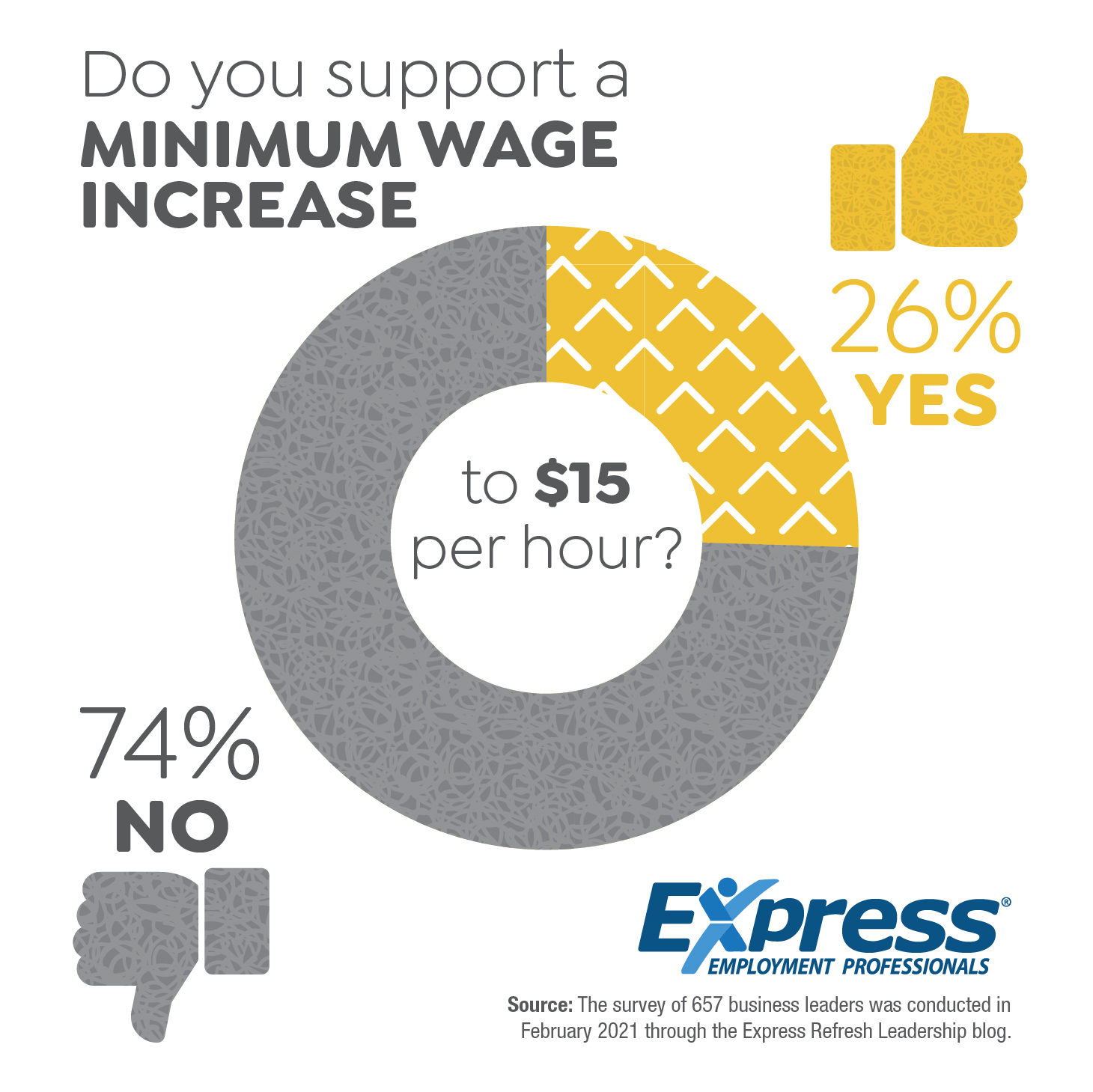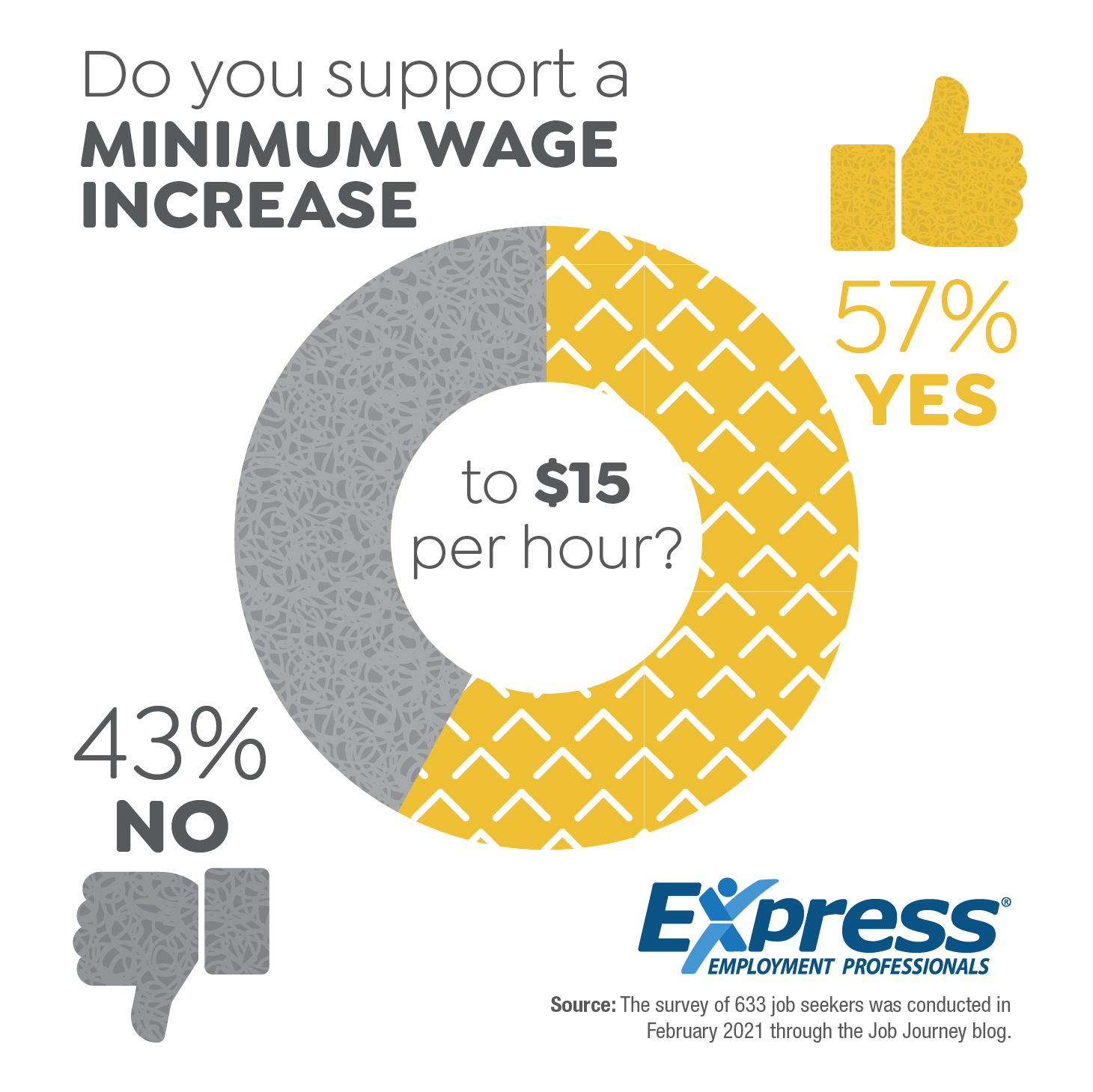According to a new survey, 74% of business leaders do not support a $15 minimum wage, while job seekers narrowly support the measure at 57%. The poll of 1,290 business leaders, decision makers and job seekers was conducted in February 2021 through Express Employment Professionals’ Refresh Leadership and Job Journey blogs for business leaders and job seekers.
When asked how a $15 minimum wage would impact their workforce, 51% of business leaders said they would have to reduce their employee numbers, while 42% said there would be no impact. Seven percent (7%) said they could increase headcount with the change.

Job seeker survey respondents were more divided, with many supporting a $15 minimum wage, but others voiced concerns about the impact. While respondents pointed to the increasing cost of living as a reason for their support, others were worried that a $15 minimum wage would cause the cost of living and the costs of goods to increase, essentially negating any benefit from higher wages. Others were concerned about the inability of small businesses to afford a higher minimum wage, causing them to close and lay off their workers.

In Abbotsford, British Columbia, where the minimum wage is set to increase to $15.20 in June of this year, Express franchise owner Dany Purdy warns that decisions on minimum wage that were made before the pandemic may hit businesses especially hard now.
“I don’t believe that a minimum wage increase is a responsible fiscal policy during the pandemic,” Purdy said. “Small businesses are the lifeblood of the Canadian economy and many were decimated by government-mandated closures and reductions in hours. The post-COVID economic recovery in Canada is contingent upon small businesses receiving orders, hiring, manufacturing, and delivering their goods and services.”
Bruce Hein, an Express franchise owner in Sarnia, Ontario, emphasizes the need to try to find a balance when it comes to minimum wage increases.
“It’s important to balance the wellbeing of both companies and workers,” Hein said. “It’s a good thing when workers have more money in their pockets because they then spend it, putting money back into the local economy. On the other hand, governments do have to be cognizant that businesses are competing globally, so legislating higher labour costs may not deliver the desired results, however good the intentions.”
He agrees with Purdy that small businesses are less likely to be able to absorb a minimum wage increase after a year in which many were shut down for long periods of time.
“Every company is in a different position and some will be able to manage a small increase while others are barely hanging on after the past year,” Hein said. “Small businesses will have the hardest time with increased labour costs after being closed for extended periods, compared to big box retailers who have remained open and busy.”
According to Purdy, less hiring is not the only potential negative impact of increasing the minimum wage.
“At each annual minimum wage increase over the past few years, we immediately saw two impacts, the first being clients reduced their entry-level labour hours in the two months after the increase,” Purdy said. “Second, in the two months before the increase, entry-level workers and average wage earners alike demanded significant wage increases over and above the minimum wage. Many workers with seniority and higher productivity than their lesser paid colleagues, were essentially disincentivized and demoted by the wage increase.”
This means that young people entering the workforce with no employment experience, such as teens, are usually the ones most negatively impacted by minimum wage increases.
Hein notes that modest, incremental increases seem to have less of a negative impact on businesses.
“Ontario’s most recent minimum wage increase was 25 cents, which wasn’t nearly as jarring as the previous increase to $14.00 from $11.60,” Hein said. “There was a lot of concern from small businesses ahead of that first significant increase, but we didn’t witness the same apprehension with this latest small increase.”
With the potential to impact so many parts of the economy, Express CEO Bill Stoller said any action on a $15 minimum wage should be weighed carefully.
“Despite making strides to repair the economy, many businesses are still struggling to recover from the COVID-19 shutdowns,” he said. “Now might not be the best time to put their existence in further jeopardy. Everyone deserves a fair wage, and we see wages going up across the country as demand picks up again.”

No comments yet.